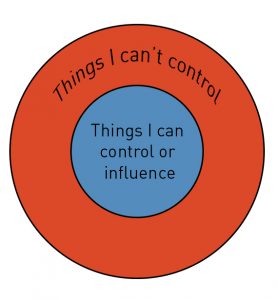
Why are farmers so stressed?
 There are many sources of stress in the farming environment which can impact on us both psychologically and physically.
There are many sources of stress in the farming environment which can impact on us both psychologically and physically.
In theory, we should worry about the things that are within our circle of influence and not the things we can not control (outside our circle of influence). Easier said that done, we know.
There are many concerns we have as farmers that cause us stress. However, there is very little we can do about some of these concerns, yet they are often the topic of conversation. For example, we love to have a good old conflab about the weather.
Outside our circle of influence
- Price volatility
- Climatic conditions/weather
- Increased mechanisation
- Increased regulation
- Disease outbreaks
Inside our circle of influence
Rural isolation
The erosion of a sense of community is an issue for both rural and urban areas, however with the population sparser in rural areas and an influx of non farming inhabitants, you may find it difficult to engage and interact with other members of the farming community and maintain a support network of expertise and common understanding.
Succession
Lack of succession planning can be more stressful than the planning process. Without a succession plan there are many unknowns and uncertainties. Mature farmers may not know how they will support themselves into retirement, or even if they can afford to retire at all. Younger generations also face an uncertain future. Should they put in time and effort without knowing if they will one day inherent the farm or not?
Lack of defined goals
We become farmers for many reasons. If we know why we are farming and have defined, time bound goals, we are more likely to gain a sense of satisfaction for our efforts. Goals provide focus, allow us to measure progress and be more resilient to day to day issues and setbacks.
Those of us who have chosen to farm, and had the option of alternative vocations, experience a greater sense of fulfillment than those of us who felt pressured to become involved in the family farm.
Lack of support
If we work well together on farm, then we often find that a natural support and mentoring process occurs. However, often two family members can have very different ideas. For example, younger generations may bring new and innovative ideas, while those who have been farming for sometime may resist change.
Neglecting of self-care
We know that it is important to maintain our machinery, to vaccinate our animals, fertilise our soil, but how often do we proactively take care of ourselves?
Working hours
The average working week is 35.7 hours, however many of us are working 65-70 hours per week. This leaves little time to kick back and relax, engage in hobbies and spend time with our family and friends away from the farm.
Work life balance
The boundaries between work and home are easily blurred as we often live and work in the same place. It’s not uncommon to be discussing farm matters around the kitchen table at meal times.
Sleep
Poor sleep affects our mood, concentration, ability to make decisions and to perform tasks safely. Long working hours resulting in early mornings combined with late nights and an inability to wind down after a busy days farming often leads to a sleep deficit.
Reference
Leonard, J. (2015) Stress Management in Farming in Ireland. Available at: http://www.nuffieldinternational.org/rep_pdf/1444042688Joseph-Leonard-2014-report.pdf (Accessed 27 March 2019)